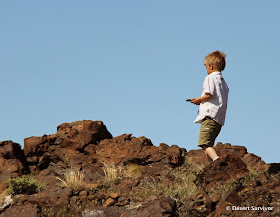This last weekend we decided to have a volcanic theme and visit several volcanic areas. First up was Sunstone Knoll, about 13 miles south on Highway 257 from Delta (near mile marker 56). A BLM sign helpfully points out the turnoff. Right after the turnoff you cross the railroad tracks, and we noticed a train was coming. The kids were delighted.
After watching the train go by, we parked next to several other vehicles. An extended family was out for a morning of fun. Sunstones are a slightly yellow, nearly transparent semi-precious gem. They were extruded from volcanic vents and are found with the basaltic lava and volcanic breccia. If the sun is shining, it is easy to find these labradorite crystals, as they sparkle in the sunlight. They are generally quite small, but they can be abundant and it is like a treasure hunt to find them.

We were also on another treasure hunt: to find the geocache at Sunstone Knoll. We had success, and the kids are getting better about really watching their surroundings.
I got distracted by this pretty hemiptera, a true bug. I liked the reddish markings.
Of course, Desert Girl was hiking in style. I made her wear her new hiking boots and pants, but she figured out a way to liven up her outfit.
We were all entranced by a horned lizard.
The kids followed it to a bush and then decided they had to catch it. I wasn't so sure they could...
…but they did!
After Desert Boy's inspection (he now wants to be a zookeeper when he grows up, but he doesn't want to clean the animal pens), it was time for the handoff.
Desert Girl was happy to hold the lizard. She later caught one all on her own.
Then it was time to leave Sunstone Knoll and its interesting geology and head to nearby Clear Lake Waterfowl Management Area (go 1.5 mile further south on Highway 257, then 6 miles east on the signed road). This area consists of 6,190 acres of open water, wetlands, and uplands. It was purchased in the 1930s primarily to provide bird habitat. In February and March, it hosts thousands of snow geese. During spring and fall, it is an important migratory stop. Clear Lake is pretty primitive, with no facilities.
The first sign we saw was next to a dried out area, so it didn't look too promising. Fortunately down the road we found some water.
We did see our next destination, Pahvant Butte, the prominent volcano south of Delta. Our big plan for the day was to hike it, so we didn't spend much time at Clear Lake.
But there is a geocache hidden at Clear Lake, so we went in search of it and found some additional wet areas.
On the way, we found this awesome truck.
"Clear Lake-Greatest Wetland in the World"














No comments:
Post a Comment
Hi, I love to read your comments! I've recently decided to turn off word verification to make it easier to leave comments, but in doing so, I'm only accepting registered users to avoid spam. You can also leave comments on the Desert Survivor Facebook page. Thanks!